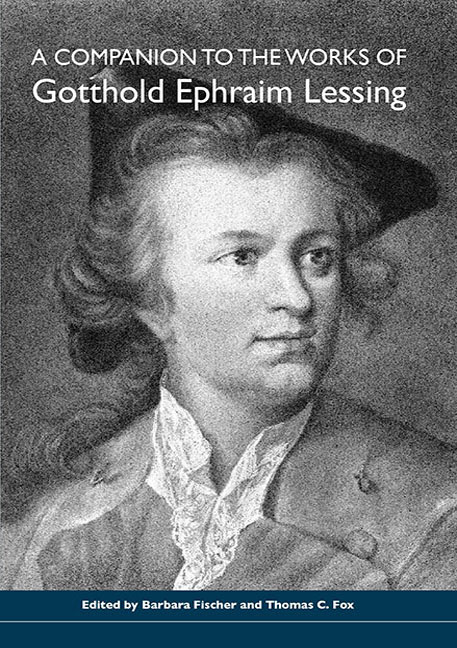Book contents
- Frontmatter
- Contents
- List of Illustrations
- Acknowledgments
- Lessing Editions and Abbreviations
- Selected Works by Lessing
- Introduction
- Lessing's Life, Work, and Times
- Criticism and Aesthetics
- Philosophy and Theology
- Lessing and Philosophy
- Lessing and Theology
- Lessing and the Jews
- Drama and Drama Theory
- Reception
- Contact Organizations
- Works Cited
- Notes on the Contributors
- Index
Lessing and Philosophy
from Philosophy and Theology
Published online by Cambridge University Press: 28 April 2017
- Frontmatter
- Contents
- List of Illustrations
- Acknowledgments
- Lessing Editions and Abbreviations
- Selected Works by Lessing
- Introduction
- Lessing's Life, Work, and Times
- Criticism and Aesthetics
- Philosophy and Theology
- Lessing and Philosophy
- Lessing and Theology
- Lessing and the Jews
- Drama and Drama Theory
- Reception
- Contact Organizations
- Works Cited
- Notes on the Contributors
- Index
Summary
Lessing was not a philosopher. But philosophy is a recurrent presence in his works. Whether or not his scattered references on the subject reflect a consistent philosophical viewpoint is, however, debatable. Thomas De Quincey could declare in 1826: “In the works of Lessing as a whole, there is one defect which has often been complained of, viz. that his philosophy is fragmentary, too much restrained to particular applications, and incapable of combination or perfect synthesis.” These words remain valid today to the extent that few would now claim to reduce Lessing's assorted pronouncements to a unified philosophical system; but conversely, few would now echo De Quincey's view that this is necessarily a defect to complain of.
De Quincey identifies one of the reasons why Lessing's philosophy is not systematic, namely its occasional character; for Lessing employs different philosophical approaches in different works as he engages with different problems in ethics, aesthetics, and religion or speculates freely in his later years on metaphysics and on the past and future history of humanity. But other factors also contribute to the unsystematic character of his thought. In the first place, he was not exclusively influenced by any single school of philosophy — and even if he had been, his temperamental distrust of authority would soon have led him to question it. Instead, he was exposed from the start to numerous currents of European thought, and like many of his German contemporaries, he was happy to draw on several of them as the need arose. Secondly, the posthumous publication of major works by Gottfried Wilhelm Leibniz (1646–1716) in the later 1760s, together with Lessing's increasingly relativistic attitude towards religious truth after he encountered Hermann Samuel Reimarus's (1694–1768) critique of revelation in those same years, led him to adopt a perspectival approach to philosophical and religious questions during the last decade of his life. And finally, growing ever more distrustful of all dogmatic claims as the religious controversies of his last years intensified, he developed a distinctive mode of tentative, self-subverting, yet richly suggestive utterance in his later works, simultaneously proclaiming and questioning a vision of human progress throughout history. The following discussion will examine each of these factors in turn, beginning with the diverse philosophical currents to which Lessing was exposed in his formative years. It will conclude with a brief account of his reception of Benedict de Spinoza (1632–1677).
- Type
- Chapter
- Information
- A Companion to the Works of Gotthold Ephraim Lessing , pp. 133 - 156Publisher: Boydell & BrewerPrint publication year: 2005



